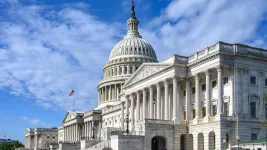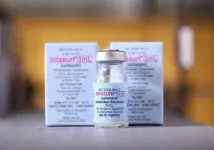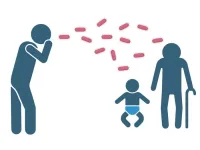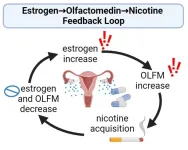(Press-News.org) Following the events of Jan. 6, 2021 — when a violent mob stormed the U.S. Capitol building in an effort to interrupt the certification process of the 2020 presidential election — experts began to question how to protect the next presidential election from a similar threat. To that end, University of Notre Dame political scientists have partnered with preeminent scholars of democracy from across the country to produce a set of recommendations to strengthen and safeguard democracy in America.
The University’s Rooney Center for the Study of American Democracy established the January 6th, 2025, Project in an effort to understand the social, political, psychological and demographic factors that led to that troublesome day in our nation’s capital. By pursuing research, teaching and public engagement, the project offers insight into how American democracy got to this point and how to strengthen and protect it, while emphasizing how to prepare for a similar attack many deem imminent on Jan. 6, 2025, when Congress seeks to certify the 2024 presidential election results. The project includes 34 members who represent various disciplines and leading universities — 10 of whom hail from Notre Dame’s faculty.
Matthew E.K. Hall, director of the Rooney Center, said one of the project’s first goals was to create a collection of essays written by its members to be included in a special issue of the Annals of the American Academy of Political and Social Science, which was published this month. These essays aim to draw attention to the vulnerabilities in our democratic system and the threats building against it, and to create consensus on ways to remedy both problems.
The authors set out to tackle the following tough questions, but from different perspectives: How serious are the threats to our democracy, how did we get to this point, and what can we do to fix the situation? The 14 essays are broken down into categories, falling under the headings of “‘Us’ Versus ‘Them,’” “Dangerous Ideas” and “Undermining Democratic Institutions.” With most pieces being co-authored by faculty from multiple institutions, the collection offers a collaborative approach to evaluating what led America to this crisis and how to avert it.
David Campbell, director of the Notre Dame Democracy Initiative and the Packey J. Dee Professor of American Democracy in the Department of Political Science, described the project as “an example of how Notre Dame can be a national leader on the issue of preserving American democracy. Not only do we have top scholars working on the issue, but we can provide a forum for a community of scholars across many leading universities. Maintaining democracy will require all hands on deck.”
In the collection’s introduction, Hall explained the backdrop of what led America to this point and why these essays help acknowledge the challenges we are facing as a nation. “We are basically living through a revival of fascist politics in the U.S.,” Hall wrote, “where politicians are using divisive rhetoric to separate us into an ‘us’ versus ‘them’ paradigm — left versus right, white versus Black, rich versus poor, urban versus rural, religious versus secular — the divisions go on and on.”
Hall estimated that between 25 and 30 percent of Americans have consistently endorsed some fascist ideas such as racial oppression, conspiracy theories and authoritarianism. “Ordinarily, this consistent minority is held in check by the democratic process,” Hall explained. “These candidates don’t even get nominated for major political positions because their co-partisan allies don’t want to lose the general election.
“But when our politics become this intensely polarized, most partisans will support their party no matter who is nominated,” he continued. “As a result, politicians pushing these fascist ideas can gain power by taking over one political party and then exploiting the polarization to win elections. Once taking power, they will likely manipulate the electoral process to remain in power.”
Consequently, Hall said, fascist leaders are able to exploit these social divisions to break down basic social norms and shared understandings about American politics. This pushes huge swaths of society toward accepting dangerous ideas that would normally be rejected, such as expanded executive power, intense animosity toward political opponents, a wavering support for free speech, and political candidates who deny election losses. This weakened support for democratic norms enables attacks on our democratic institutions, such as ignoring court rulings, enacting voter suppression laws and — most shockingly (as in the case of Jan. 6) — openly subverting elections.
With the political situation as dire as many feel it to be, the January 6th, 2025, Project’s essays outline a few practical steps that can be taken to strengthen and safeguard democracy in America.
For example, Hall said, as the nation moves forward into this next election year, American voters have to stay focused on the “deliberate denial of reality” on the part of some politicians so that they can discern the difference between lies, truths and just plain distractions.
“The more we lose touch with basic facts and accept misinformation, conspiracies and contradictory claims as the norm in our society,” he said, “the more vulnerable we are to losing our democracy.
“Even more importantly, we have to be willing to sacrifice short-term political gains in order to preserve the long-term stability of our democracy. That might mean holding your nose to vote for candidates that you would not otherwise support.”
Hall added that Americans must redouble their devotion to democratic principles such as open elections and free speech, and states should adopt institutional reforms that remove partisans from the electoral process (for example, employing nonpartisan election commissions). He also noted the importance of paying close attention to efforts that divide groups of Americans, especially those that portray outgroup members as evil or less than human.
The members of the project hope that by honestly acknowledging the challenges our nation is facing, understanding the mistakes that were made and recognizing the vulnerabilities in our system that led us to this situation — and by resolving to fix these issues — we can pull our country’s political system back from the edge of the cliff before it’s too late.
“The public needs to take these critical threats seriously and we’re hoping that these essays draw attention to them, and help to build consensus about the underlying problems in our politics and potential remedies,” Hall concluded.
Notre Dame faculty who are members of the January 6th, 2025, Project include David Campbell, the Packey J. Dee Professor of American Democracy; Darren Davis, the Snyder Family Mission Professor of Political Science; Luis Fraga, the Rev. Donald P. McNeill, C.S.C., Professor in Transformative Latino Leadership; Matthew E.K. Hall, the David A. Potenziani Memorial College Professor of Constitutional Studies; Jeffrey Harden, the Andrew J. McKenna Family Associate Professor of Political Science; Geoffrey Layman, professor and chair of the Department of Political Science; Rachel Porter, assistant professor of political science; Ricardo Ramirez, associate professor of political science; Erin Rossiter, the Nancy Reeves Dreux Assistant Professor of Political Science; and Christina Wolbrecht, the C. Robert and Margaret Hanley Family Director of the Notre Dame Washington Program and professor of political science.
Democracy is one of several University-wide initiatives emerging from Notre Dame’s recently released Strategic Framework. The Democracy Initiative will further establish Notre Dame as a global leader in the study of democracy, a convenor for conversations about and actions to preserve democracy, and a model for the formation of civically engaged citizens and public servants. The Democracy Initiative will connect research, education and policy work across multiple campus units and will extend Notre Dame’s voice to policymakers and federal agencies in Washington, D.C.
Contact: Tracy DeStazio, associate director of media relations, 574-631-9958 or tdestazi@nd.edu
END
Essays on democracy draw attention to critical threats, explore safeguards ahead of Jan. 6
2024-03-25
ELSE PRESS RELEASES FROM THIS DATE:
New surfactant could improve lung treatments for premature babies
2024-03-25
Scientists have developed a new lung surfactant that is produced synthetically rather than relying on the use of animal tissues. With further development, the formulation could provide a cheaper and more readily available alternative to Infasurf, a medication used to prevent and treat respiratory distress in premature babies.
Surfactants are substances that decrease surface tension where liquids interface with other liquids, gases or solids. In addition to their use in medicines, they are found in a wide range of products including detergents, cosmetics, motor oils and adhesives.
Suzanne Farver Lukjan, a lecturer in chemistry ...
Researchers uncover key biomolecule involved in whooping cough infection
2024-03-25
Researchers have identified a new complex-carbohydrate biomolecule, or glycan, that plays a key role in the nasal colonization of the Bordetella bacteria responsible for whooping cough. The discovery could make it possible to create a new drug or vaccine that interferes with the glycan to greatly reduce or even stop ongoing Bordetella transmission.
Bordetella pertussis is the cause of the respiratory infection pertussis, which is widely known as whooping cough. Today’s pertussis vaccines keep people from getting severely sick, but they don’t eliminate the bacteria because it excels at colonizing, ...
Study links long-term consumption of reused deep-fried oil with increased neurodegeneration
2024-03-25
A new study found higher levels of neurodegeneration in rats that consumed reused deep fried cooking oils and their offspring compared to rats on a normal diet. Deep frying, which involves completely submerging food in hot oil, is a common method of food preparation around the world.
Results from the study also suggest that the increased neurodegeneration is tied to the oil’s effects on the bidirectional communication network between the liver, gut and brain. The liver–gut–brain axis plays a crucial role in regulating various physiological functions, and its dysregulation has been ...
Study suggests statins could help fight gum disease
2024-03-25
Could taking statins benefit your mouth in addition to your arteries? A new study conducted in cell cultures showed that cholesterol-lowering drugs help to dampen the inflammation associated with periodontal disease by altering the behavior of macrophages, a type of immune cell.
Statins are the most common type of prescription medication in the United States today, taken by over 40 million Americans to lower cholesterol. The study suggests these drugs improve gum health and reduce the risk of heart disease.
Subramanya Pandruvada, an assistant professor in the College ...
Study suggests that estrogen may drive nicotine addiction in women
2024-03-25
A newly discovered feedback loop involving estrogen may explain why women might become dependent on nicotine more quickly and with less nicotine exposure than men. The research could lead to new treatments for women who are having trouble quitting nicotine-containing products such as cigarettes.
Sally Pauss is a doctoral student at the University of Kentucky College of Medicine in Lexington. She led the project.
“Studies show that women have a higher propensity to develop addiction to nicotine than men and are less successful at quitting,” said Pauss, ...
The complexities of lung cancer screening decisions among patients with comorbidities
2024-03-25
Many individuals eligible for lung cancer screening (LCS) also suffer from multiple health issues at the same time, known as comorbid conditions. This study explores how primary care physicians (PCPs) factor comorbidities into their shared decision-making conversations with patients to discuss the harms and benefits of lung cancer screening. Researchers conducted semi-structured interviews with 15 PCPs affiliated with the Mount Sinai Health System in New York City between October 2020 and February 2021. PCPs were asked questions to examine their understanding of how comorbidities ...
ChatGPT’s potential and limits in summarizing medical research for clinicians
2024-03-25
Large language models (LLMs) are neural network–based computer programs that use a detailed statistical understanding of written language to perform many tasks, including text generation, summarization, software development, and prediction. However, LLMs can produce text that, while may seem correct, is not fact-based. This study investigates whether a popular LLM, ChatGPT-3.5, could produce high-quality, accurate, and bias-free summaries of medical research abstracts and determine the relevance of various journals and their articles to different medical specialties. Ten articles ...
Pediatric health care disrupted by COVID-19 pandemic, compounded by existing barriers such as systemic racism
2024-03-25
This study explores the extent to which pediatric health care was interrupted during and as a result of the COVID-19 pandemic. This was measured based on three primary outcomes of interest: foregone care, foregone well-child or vaccination-related visits, and complete absence of well-child or vaccination-related visits. Researchers extracted data from a nationwide longitudinal survey known as CovEx (COVID Experiences Survey) that had been administered in two “waves'' to a cohort of parents of children between five and 12 years of age. Wave 1 took place October 8-November 13, 2020, and Wave 2 took place March 24-May 7, 2021, with an 82% retention rate of participants. Data was ...
Fathers’ perceptions of their teen sons’ readiness for sex linked to their likelihood to provide guidance on condom use
2024-03-25
The purpose of this study was to delve deeper into the link between fathers’ perceptions of their adolescent sons’ preparedness to engage in sexual intercourse, and how likely they were to provide their sons with guidance on using condoms correctly and consistently. Researchers recruited 191 father-son pairs from among Black and Latino residents of the South Bronx in New York City; adolescent participants ranged in age from 15 to 19 years old. Using a sequential mixed-methods explanatory design, all participants completed a confidential survey, after which a random ...
Survey on genital tucking among transgender and gender diverse individuals: Majority of respondents desire open conversation with health care providers
2024-03-25
Genital tucking is the practice of hiding or minimizing the appearance of one’s genitals and gonads. It is practiced by transgender women and gender diverse individuals who were assigned male at birth. In this study, researchers designed a 27-question survey related to such factors as the length of time individuals spent tucked; how commonly and frequently; and understandings of, concerns for, and positive/negative history of potential adverse effects. Only 23% of the 98 respondents reported discussing ...





